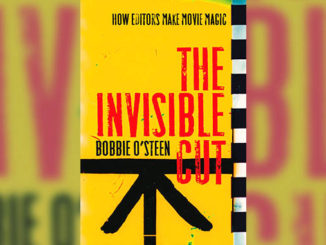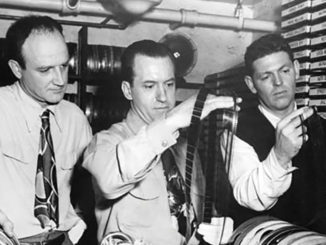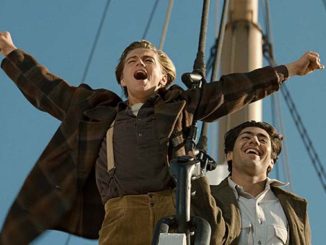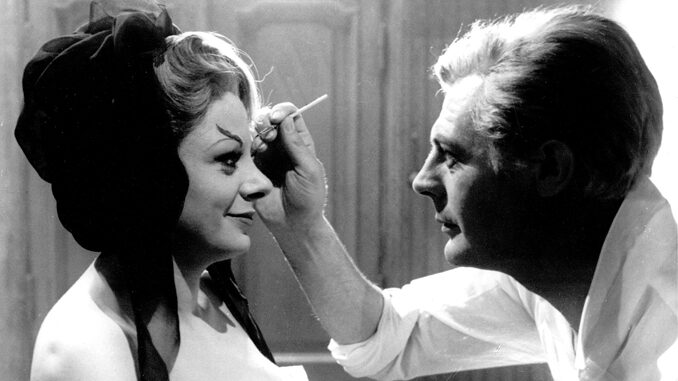
by Aaron I. Butler
When I was little, I always dreamed of becoming a lawyer. Not exactly a glamorous dream, but I was a very practical kid. In high school, I began making short films as a hobby, but when I went to college, I held firm and chose to study law. In all my spare time I continued to make shorts, but never for a moment did I allow myself to think I could make a career out of it. Then I saw a film that changed everything for me: Federico Fellini’s 81⁄2.
The film is about a successful Italian director who is having trouble with his next picture, a big-budget science-fiction movie that he has no passion for. He has retreated to a mineral spa to take the waters and try to find his muse — and has brought his entire production team with him. As the production costs rise, the director becomes more and more paralyzed with indecision, in both his professional and personal lives. Whether it’s choosing which actress to cast, or deciding whether to stay with his wife or his mistress, he finds himself caught in lies and avoidance. In an attempt to bring some truth into his life, he has filled his new movie with characters based on his own relationships and episodes from his childhood. But, ironically, his film feels less “real” and meaningful to his co-workers.
Fellini’s techniques opened my eyes to a whole new way of storytelling.
81⁄2 completely overwhelmed me when I first watched it. The style of the filmmaking was so incredibly different from the American films I was used to watching, and the story of a man unable to live his truth strongly resonated with my own life.
What first struck me about the filmmaking was the liberal use of abstract and surreal imagery. Most American films felt very “real” in the sense that the movies were shot to mimic real life, as if you were standing there watching the actors. But Fellini’s film had a kind of hyper-realism, where different aspects of clothing, mannerism or setting were exaggerated or manipulated. While this surrealism made the scenes look less real, it actually made them feel more real, bringing more of the truth of the characters and the scenes to the surface.
For example, one of the scenes shows the main character going to drink some mineral water from the spring. It’s easy to imagine a simple moment where a man waits patiently in line for a drink, but instead, Fellini gets unreal. He places an orchestra at the spring, which plays Wagner’s hugely stirring “Flight of the Valkyries.” The camera pans around to all the different characters at the spring — some young, some old, some nuns and priests — but mainly rich folks dressed in outlandish outfits. Taking the waters comes across as this overly dramatic, almost silly act. By using this dreamlike imagery, he shows us the truth of the spa — that most of the people are there for superficial reasons. Fellini’s techniques opened my eyes to a whole new way of storytelling.
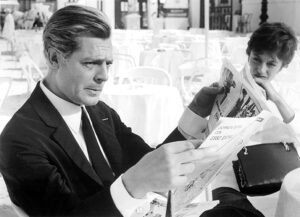
But it wasn’t just the filmmaking style that moved me. I also connected with the story of the unhappy director because I was experiencing a similar problem with my life. Here I was getting ready to become a lawyer, but I wasn’t finding the slightest bit of pleasure in it. In all my spare time, I was making short films — and that was what made me happy.
At that point in my life, I was also beginning to question my sexuality. I was living a lie both personally and professionally, and 81⁄2 spoke to me in a way few films ever had. It showed me that I would have to make some hard decisions and confront difficult feelings if I was ever to find happiness.
Eventually, during my senior year of college —right before I was getting ready to take the LSATs — a friend asked, “Why aren’t you going to film school? After all, you spend all your free time making movies; why not make that your career?” It was a very good question, and I decided to take his advice and look into it. Within a year, I was the lead editor at a documentary production company at the Saul Zaentz Film Center. I never made it to law school, or even film school, but I finally found my happiness. Seventeen years later, I’m still living that dream.
81⁄2 was a huge critical success for Fellini and won the Academy Award for Best Foreign Film. It’s considered one of the greatest and most influential films of all time. But for me, it was something much more personal. It was an inspiration to my work and my life. I can only hope that the films I work on have as much impact on someone as 81⁄2 had on me.


